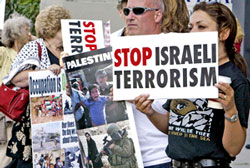U.S. Political Prisoner listing (Jericho Movement)

WASHINGTON (FinalCall.com) – Palestinian activists have been touring the United States during the month of April to get people in this country to understand that their government’s blind support of Israel’s occupation of Palestinian land denies the rights of the Palestinians.
“First of all, we think that the Americans should do more than they do to affect their government,” Attorney Sahar FrancÃs, a Palestinian lawyer who has worked for many years with Palestinian prisoners said in an interview.
“We believe, in the Middle East, that the United States has a very big role in our conflict, between the Palestinians and the Israelis. They are all the time standing behind the Israeli side, ignoring the basic rights of the Palestinians. We believe that the change should be coming from the people, in every place in the world,” said Atty. FrancÃs.
Activists delivered petitions to the International Committee of the Red Cross April 6, calling on the organization to “take effective and public action against Israel’s widespread use of torture against Palestinian detainees; and immediately demand that sick and injured prisoners are provided with adequate medical treatment; and to pressure Israel to allow family visits by Palestinians to their relatives in Israeli jails.”
Treated like criminals, rather than as those who are legitimately resisting the Israeli occupation, Palestinians are removed from the occupied territories where they are captured, to jails inside Israel proper, far away from their families, Atty. FrancÃs said.
“According to the international law, it’s very obvious,” she continued. “The international law gives any people in the world, if they are under occupation, the right to resist the occupation, even using the military activities against the occupation. It means that you could be a citizen, and you have the right to resist.
“The Israelis are treating them as criminals by definition. If you are a Palestinian and you are resisting the occupation–and it doesn’t matter what you are doing, throwing stones, making demonstrations, strike or anything–you could be tried as a criminal, that you did a crime, not resistance,” she said.
Already victims of unjust imprisonment, Palestinians are often tortured and humiliated by Israelis when they are arrested. But those arrests are worn proudly as badges of courage, Akram Al Ayasa, an ex-political prisoner and former president of Bethlehem University Student Council, who was arrested seven times by Israeli occupation forces, said in an interview.
“If you are arrested in the United States seven times, of course, most of the time it will be interpreted as you are a criminal,” he explained. “But if you are a Palestinian, active in the student movement, of course you will not be; you will be like a hero. And the people will welcome you, very much.”
Palestinians recognize their rights to resist, and insist on that right being recognized by people throughout the world, he said.
“Reality, just to be, or live in Palestine is a matter of resistance. To cross checkpoints daily, you have to resist in one way or another. It depends which way we define resistance. The only Palestinian who is not resistant (is) the one who could just stay at home and not go to work. Daily, crossing the checkpoint, you have to resist, you have to argue, you have to defend your rights to go from place to place,” said Mr. Al Ayasa. “I’ve never been arrested without being tortured. With different kinds of things, especially in the first two or three weeks; once, it was the first two months. I have suffered in the past all these different kinds of being beaten and insulted.”
Currently, more than 7,500 Palestinian political prisoners are being held in Israeli jails, Atty. FrancÃs said. Of those, 345 are juveniles and another 100 are women. These prisoners face torture and mistreatment during their arrest and detention, according to S.U.S.T.A.I.N. (Stop U.S. Tax-funded Aid to Israel Now!), the group that organized the speaking tour, along with Students for Justice in Palestine, and the group Critical Resistance.












